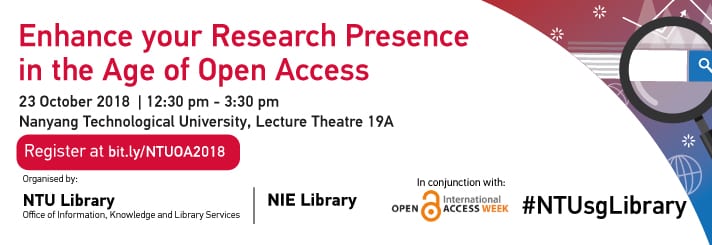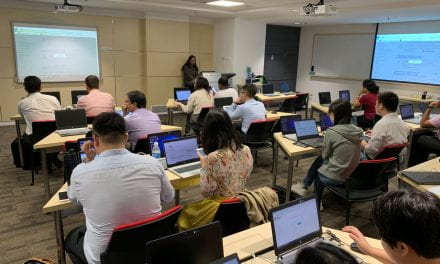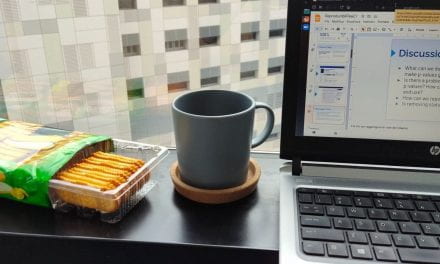In conjunction with the 11th International Open Access Week, NTU Library and NIE Library co-organised a half-day event on 23 Oct 2018. This year, the seminar titled ‘Enhance your Research Presence in the Age of Open Access’ attracted more than 200 sign-ups from NTU faculty, research staff, PhD students as well as external institutions.
After the welcome speech by Prof. Kam Chan Hin, Deputy Provost (Education), three guest speakers from Taylor & Francis, De Gruyter, and ORCID presented tips to help researchers increase their research visibility and maximise the impact of their research. Presentations by the speakers and questions & comments shared by participants could be found below:

Lyndsey Dixon,
Editorial Director, Asia Pacific Journals,
Taylor & Francis
.@lyndseydixon, Editorial Director from @TandF_APAC kicks off the session with "How to increase research visibility". Follow @tandfauthorserv for more info!#NTUsgOA#OAweek #OpenAccess
— NTU Library (@NTUsgLibrary) 23 October 2018

Emily Poznanski,
Manager, Open Access Strategy,
De Gruyter
There are open access journals, but heard of #OpenAccess books? Emily Poznanski from @DeGruyterOA (Tthe largest independent publisher of open access books!) now shares about maximizing the impact of your research with open access books....#NTUsgOA #OpenAccess pic.twitter.com/q278g2hKzT
— NTU Library (@NTUsgLibrary) 23 October 2018

Matthew Buys,
Director of Engagement, ORCID
It's ORCID, not orchid! ??@mjbuys from @ORCID_Org shed light on incorporating ORCID in research information workflows#NTUsgOA#OAweek #OpenAccess#OpenAccessWeek #openaccessweek2018 pic.twitter.com/W7XxdUvvCS
— NTU Library (@NTUsgLibrary) 23 October 2018
Click here to see the questions asked by participants:
- Could the slides from all the presenters be made available to the audience?
- What are the publishing fees we are talking about? And does university support staff financially in publishing through OA?
- Open access publishing is a non zero sum game;publishers benefit from higher visibility of research papers(in terms of gaining more citations and as a result increasing the impact factor of the journals, etc.)as well as researchers. The questions is why open access fee is billed to researchers only?
- Open Peer Review – what is done to ensure that reviewers are experts in the field? Or can just anyone provide review since it is open?
- What motivation do authors have to publish open access books? They have to pay (and don’t get royalties?)
- Hi, if I’ve a social sciences article that has been accepted by a journal editor but still stuck at the copy editor’s desk, could I post the edited and peer-reviewed version (not typeset yet) onto Academia.edu etc ? If not what other outlets could I publicise it on? thanks!
- Can OA fees be incorporated into grant applications to cover the costs of all publications from that project?
- If we’re doing systematic/lit reviews, the data we’re collecting/analysing are journal articles; if these articles were retrieved from subscription journals, it would not be possible to deposit this “data” in repositories?
- If I had published before getting my orcid id, how can I add my id to the earlier publications?
- How is ORCID different from researchgate?
- Are peer review comments visible in open access? Harsh negative comments or poor quality reviews visible to the world?
- What does O-R-C-I-D stand for?
- Freemium – publisher release basic version for free, author pays for “full” versionWhy does author pay for “full version” instead of the reader?
- Is SciHub a viable alternative to OpenAccess?
- If we already have an ORCID set up, do we still need to set up other IDs (Google Scholar, Scopus, etc.)? Why/why not?
- How does open access apply to conferences? For e.g. can we submit conference proceeding papers to DR-NTU?
- Would I be able to share accepted and edited manuscripts on Researchgate etc academic outlets if they are not published in the subscription journal yet?
- Would I be able to share Accepted Manuscripts from subscription journals?
- Do I need to manually input publications into my orcid profile when I already have an updated Google scholar profile?
- How is NTU supporting researchers publishing in OA journals/books ? Are there any special funding and help here ?
- How relevant are books these days with the explosion of journal articles?
In the following segment, Chua Junjie from NTU Library and Wong Yong Yeow from NIE Library shared how the use of various tools and platforms including the NTU and NIE repositories (research papers: NTU and NIE; research data: NTU and NIE), PlumX almetrics profile, researcher profiles, etc. could help boost research visibility. Click here to view their slides.
And now Chua Junjie one of our #NTUsgLibrians & NIE librarian, Wong Yong Yeow share on the various tools to boost research visibility#NTUsgOA#OAweek #OpenAccess
— NTU Library (@NTUsgLibrary) 23 October 2018
The seminar wrapped up with a lively panel discussion, thanks to the great questions from the audience as well as the comments from the four panellists. In addition to the three speakers, we were honoured to have Prof. Gerhard Grüber from NTU’s School of Biological Sciences to join the panel. Ms. Goh Su Nee from NTU Library, the facilitator of the panel discussion, invited the panellists to respond to the first question about article processing charge (APC). It was a difficult debate about the delicate balance between inclusivity and sustainable business models of publishers. A useful takeaway from here could be that perhaps green open access could help alleviate the imbalance. NTU supports green open access by providing DR-NTU (Open Access) to its authors to publish open access the allowed version of their research publications, typically the peer reviewed accepted manuscript of their journal papers. Otherwise, researchers could include budgetary estimates for gold open access in their grant applications. Another takeaway was that book authors would still enjoy royalties while they publish their books open access for the case of De Gruyter though such practice could vary across publishers. There was a question on Sci-Hub and panellists had advised that this is an illegal platform as it disregards copyright. Su Nee suggested to the audience to watch ‘Paywall the business of scholarship’ where the interviews include one with the creator of Sci-Hub. The panel discussion closed with wish list items for scholarly publishing. Prof. Gruber would like to see published detailed materials, methods and data becoming the norm for published research papers. Panellists suggested the topic for the next open access event to focus on open science, especially when it is the larger goal of open access and research.
Enthusiastic discussions spilled over to tea time after the close of the seminar. Some members of the audience visited one of the three ‘Researcher Profile Advisory’ booths, manned by NTU and NIE librarians, outside the lecture theatre. Others browsed through a poster exhibition about the tools and services provided by NTU Library to support open access in research. Click on the posters browser below to view the posters.
DR-NTU (Open Access) Posters
DR-NTU (data) Posters
Feel free to contact us at library@ntu.edu.sg, if you have questions unanswered.









